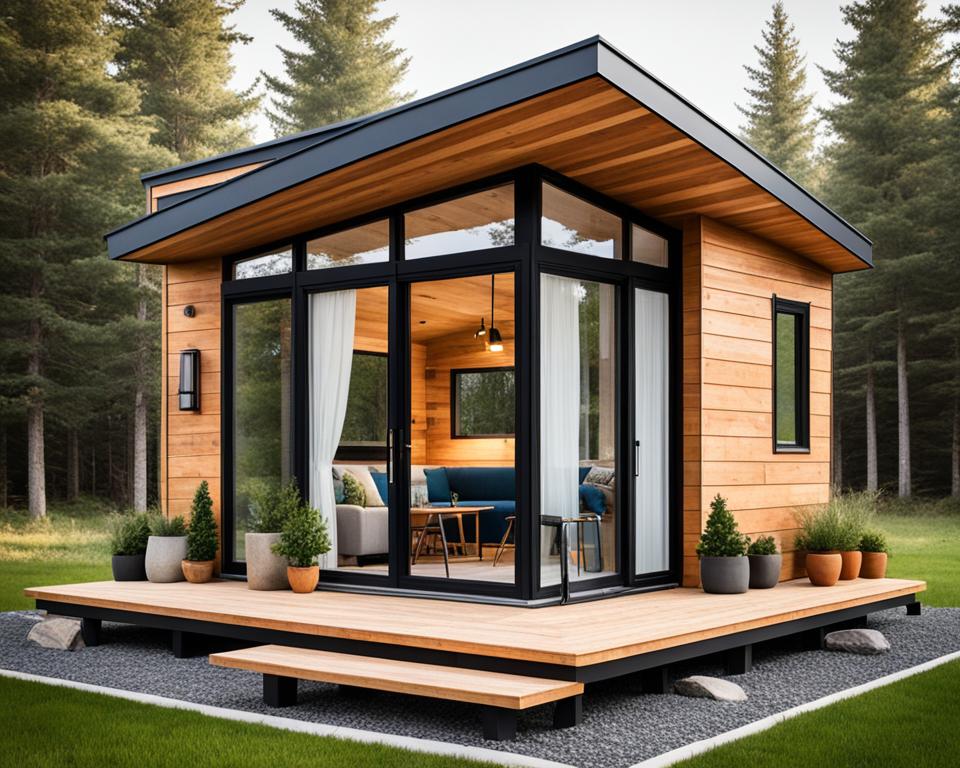Did you know the average American home size is shrinking? This is the first time in over 100 years it’s happening. This trend shows a shift toward minimalism and living in smaller spaces. Tiny house hunters are at the forefront, looking for affordable homes. They want to live simply to enjoy life more.
Let’s dive into the world of tiny house shows. This is where small home design and minimalism meet. People are choosing smaller houses to live a simpler, less cluttered life. Leaders like David Friedlander are guiding us into this new way of living. Tiny homes are not just about saving money. They’re about living better with less.
Embracing the Tiny House Movement for a Sustainable Future
The tiny house movement promotes living with less to achieve sustainability. This philosophy advocates for a simpler lifestyle, focusing on environmental care through compact homes. The charm of tiny houses comes from their design and the sustainable future they promise.
Affordable and small homes are becoming more popular. They symbolize innovation and creativity. Tiny houses encourage us to live in sync with the environment and question our consumption habits.
David Friedlander’s Journey from Micro-Apartments to Low-Impact Life
David Friedlander moved from New York’s tight spaces to advocating minimalism in Boulder, Colorado. His journey reflects a deep commitment to living simply and affordably. Now, his work emphasizes community and sustainable living at Run Haus.
Why Downsizing is an Upward Move for Environmental and Personal Balance
Choosing to live in a tiny house isn’t about giving up space, it’s about gaining balance. It shows a shift towards valuing what really matters in life. This change benefits both our personal well-being and the environment.
Learning from LifeEdited and the Shift Towards Compact Living Spaces
The tiny house movement, boosted by LifeEdited, shows how small spaces can change our lives. LifeEdited merges tiny homes with minimalism, proving quality of life isn’t lost in smaller spaces. It’s about living better and caring for the planet.
| Aspect | Traditional Housing | Tiny House Living |
|---|---|---|
| Space Utilization | Often underutilized spaces | Maximized efficiency and purpose for every inch |
| Environmental Footprint | Greater resource consumption | Reduced carbon footprint, sustainable materials |
| Cost of Living | Higher due to size and upkeep | More affordable, encourages debt-free living |
| Community Impact | Often isolated living | Promotes communal ecosystems and shared resources |
| Personal Values | Material possession-focused | Experience and relationship-centric |
Adopting tiny house living enriches our lives and aids the planet. By downsizing, we aren’t just changing our homes; we’re reshaping our view on meaningful living. It’s a journey towards better living and strong environmental commitment.
The Art of Decluttering: A Minimalist Approach to Tiny House Living
In tiny house living, we adopt a minimalist mindset. It encourages us to keep only what we truly need. This isn’t just about throwing things away. It’s about choosing simpler living—focusing on quality instead of quantity. It means clearing space not just around us, but also in our lives for the important stuff.
We find value in simplicity and living with less. By doing this, we open up room for more meaningful experiences. This approach is not about having fewer things for the sake of it. It’s about creating space for what really enriches our lives.
The design of tiny houses shows how beauty mixes with practical use. Every part of these small spaces has a purpose. There’s no space for anything that doesn’t help. By adopting this mindset, we look at our homes differently. They become places that reflect our choice for simplicity and meaning.
Living this way shows us that our things represent our goals and beliefs. Letting go of stuff can free us from the traps of always wanting more. In a minimalist life, everything we keep is both loved and needed. With fewer distractions, our lives can bloom, showing what truly matters.
In the tiny house movement, reducing our space helps us grow in other ways. It leads to a life full of purpose and happiness. Our lives become richer, not through what we own, but through the experiences we have.

